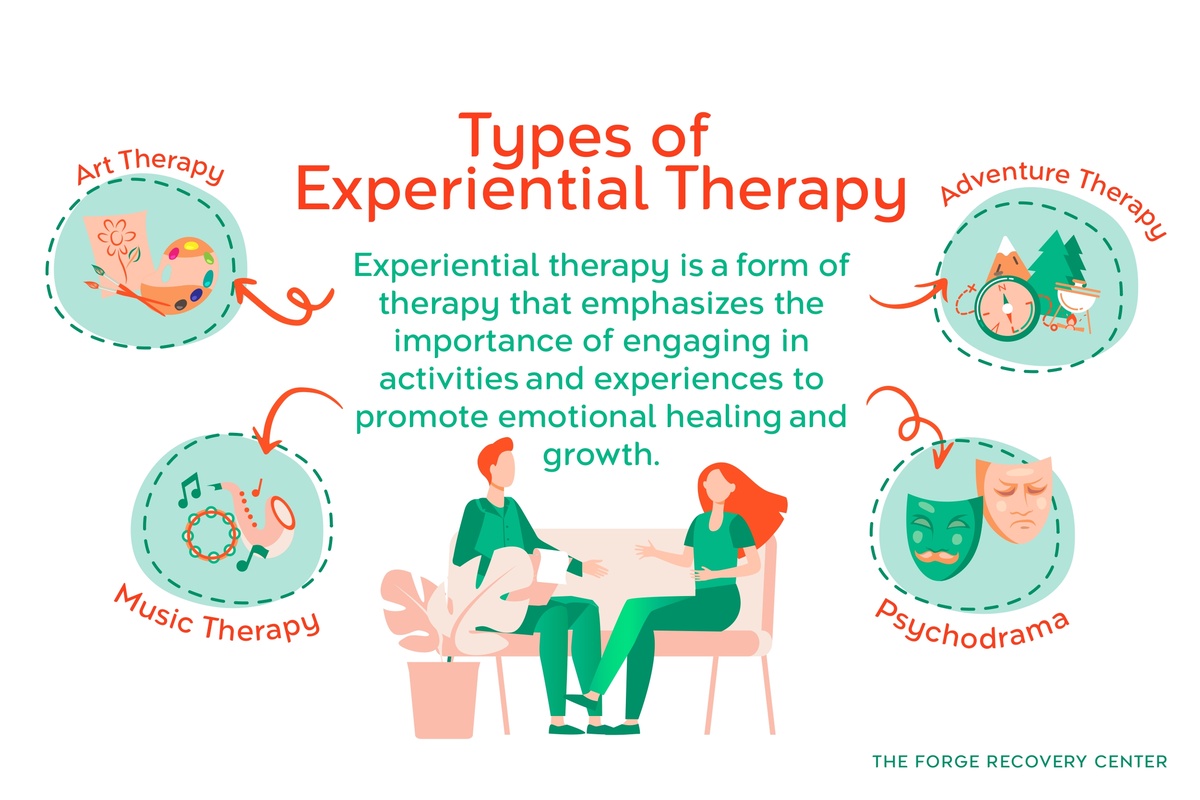Experiential Therapy: A Hands-On Approach to Treatment


Experiential therapy is a nontraditional approach that treats mental health and behavioral conditions alongside substance abuse and addiction. It uses active, hands-on experiences to help individuals confront issues and develop healthier coping mechanisms. Learn more about the applications and efficacy of this unique treatment modality, and reach out to The Forge Recovery Center today if you’re ready to start experiential therapy.
What Is Experiential Therapy?
Experiential therapy is a form of therapy that emphasizes the importance of engaging in activities and experiences to promote emotional healing and growth. This type of therapy focuses on the individual's experiences rather than solely on verbal communication. By participating in various activities such as role-playing, art therapy, or outdoor activities, individuals can gain insight into their emotions, behaviors, and relationships.
This nontraditional form of therapy aims to help individuals process and express their feelings in a non-traditional way, leading to a deeper understanding of themselves and their experiences. It can be particularly beneficial for those who struggle to express themselves verbally or who have difficulty connecting with their emotions.
Conditions Treated by Experiential Therapy
Experiential therapy can treat a range of conditions, from mental health issues and substance addiction to behavioral issues, emotional challenges, and more. Through activities like art, music, and role-playing, you can explore your feelings in a safe environment. Here’s a rundown of the conditions commonly treated with experiential therapy sessions:
Mental Health Disorders
Experiential therapy can benefit individuals with mental health disorders, such as anxiety or depression, by providing hands-on activities to express emotions. Through activities like art, music, and role-playing, you can explore your feelings in a safe environment. This therapy helps reduce negative emotions such as anxiety and depression by promoting self-awareness and emotional healing. By engaging in experiential therapy, individuals often experience an improvement in their overall well-being.
Substance Abuse & Addiction
In treating substance use disorders and drug addiction, experiential therapy can play a crucial role. It allows individuals to address underlying issues that contribute to their addiction through activities like outdoor challenges or group exercises, and techniques such as adventure-based counseling and equine therapy are commonly used in substance abuse treatment within this therapeutic approach. It's commonly included as part of drug rehab treatment plans, such as cocaine addiction, and can have a significant impact on the recovery journey.
Emotional Challenges
Experiential therapy is effective in helping individuals overcome various emotional challenges, providing a hands-on approach to processing emotions. By engaging in activities like wilderness expeditions or mindfulness exercises, you can learn to manage negative emotions effectively. This form of therapy focuses on improving emotional well-being by fostering personal development and self-awareness.
Behavioral Issues & Addiction
When it comes to addressing behavioral issues and addiction, experiential therapy offers innovative solutions through interactive experiences. This therapeutic approach aims to change negative behaviors by encouraging individuals to participate in activities that promote positive outcomes. Techniques such as ropes courses and team-building exercises are utilized to help individuals develop healthier coping mechanisms. This process can lead to significant changes in the way a person handles future relationships and situations.

Are You Struggling with Mental Health or Addiction?
We Can Help. Call Us Now!
CALL: 877-839-1772
Types of Experiential Therapy
Art Therapy
Art therapy in experiential therapy offers a unique way for individuals to express themselves. Through various art forms, you can communicate feelings that are challenging to put into words. This creative outlet helps you explore emotions and experiences in a non-verbal manner. The benefits of art therapy include promoting emotional healing, enhancing self-awareness, and reducing stress levels.
Music Therapy
Music therapy plays a vital role in experiential therapy by harnessing the therapeutic effects of music. By engaging with music, you can improve emotional well-being and enhance self-expression. Techniques such as listening to music, songwriting, and playing instruments are utilized in music therapy sessions. These activities help you process emotions, reduce anxiety, and foster relaxation.
Adventure Therapy
Adventure therapy integrates outdoor activities into experiential therapy sessions to promote personal growth and self-discovery. Engaging in challenging tasks such as rock climbing, hiking, or camping encourages teamwork, builds confidence, and fosters resilience. The hands-on approach of adventure therapy allows you to step out of your comfort zone and confront fears in a supportive environment.
Psychodrama
Psychodrama is a powerful tool used in experiential therapy to explore emotions and experiences through role-playing techniques. By embodying different roles or scenarios, you can gain insights into yourself and others. Psychodrama sessions provide a safe space for you to process past traumas, improve interpersonal skills, and enhance emotional intelligence. This interactive form of therapy encourages active participation and deepens self-awareness.
Other Experiential Therapy Techniques
Play Therapy
Play therapy is a technique where you engage in structured play activities to communicate with the therapist. Through play, you can express feelings and thoughts that may be difficult to articulate verbally. This technique is commonly used with children but can also benefit adults by tapping into their creative and imaginative side.
Narrative Therapy
Narrative therapy involves exploring the stories you tell about yourself and reframing them in a more empowering way. By examining these narratives, you can gain insight into your experiences and develop a stronger sense of self-awareness. This technique helps you create new, positive narratives that shape your identity and outlook on life.
Trauma-Informed Yoga
In trauma-informed yoga sessions, you engage in gentle yoga practices under the guidance of a trained therapist. This modality focuses on mindfulness, breathing techniques, and gentle movements to help you reconnect with yourself, release tension held in the body, and process past traumas. Trauma-informed yoga can be particularly beneficial for individuals dealing with PTSD or other trauma-related conditions.
Experiential therapy techniques have shown promising results in improving mental health by addressing underlying emotional issues through experiential activities rather than just talking. These techniques offer a holistic approach that integrates mind, body, and emotions, leading to profound insights and personal growth.

Are You Struggling with Mental Health or Addiction?
We Can Help. Call Us Now!
CALL: 877-839-1772
Financial Considerations
Before opting for experiential therapy, it’s important to understand how payment works and how your insurance coverage plays into the final costs. Here are some financial considerations to keep in mind:
Therapy Costs
When considering experiential therapy, it's essential to grasp the factors that impact its cost. Therapy costs can vary based on the duration and intensity of sessions, as well as the expertise of the therapist.
Exploring the potential expenses linked to experiential therapy sessions is crucial for effective planning. These expenses may include session fees, materials used during activities, and any additional specialized equipment required.
To manage therapy costs effectively, you can inquire about sliding scale fees offered by some therapists based on income levels. Discussing payment plans or exploring community resources for financial assistance can help make therapy more affordable.
Insurance Coverage
Insurance coverage can be a valuable support system for those seeking experiential therapy. It's important to understand how your insurance plan can assist in covering therapy expenses and what services are included in the coverage.
Certain types of insurance plans, such as private health insurance or employee assistance programs, may offer coverage for experiential therapy. Contacting your insurance provider directly to inquire about coverage specifics is crucial in determining the extent of financial support available.
Verifying insurance coverage for therapy sessions involves contacting your insurance company to confirm if experiential therapy is a covered service under your plan. Understanding any copayments, deductibles, or limitations will enable you to plan financially for your therapy journey effectively.
Effectiveness of Experiential Therapy
When it comes to research insights on experiential therapy, recent studies have shown promising results. Experiential therapy has been found effective in treating a range of mental health conditions, with research indicating that this therapy approach can significantly improve symptoms such as anxiety and depression.
Treating Mental Health Conditions
Research supports the use of experiential therapy for various conditions like PTSD, addiction, and eating disorders. Studies have demonstrated that engaging in hands-on activities during therapy sessions can lead to better outcomes compared to traditional talk therapies alone. The interactive nature of experiential therapy allows individuals to process emotions and experiences more effectively.
Expanding Applications
In the field of experiential therapy, future directions focus on expanding its applications and refining techniques. Researchers are exploring how experiential therapies can be tailored to specific populations and integrated into existing treatment approaches. The aim is to enhance the effectiveness of therapy interventions and provide more personalized care for individuals seeking mental health support.
Are You Struggling with Mental Health or Addiction?
We Can Help. Call Us Now!
CALL: 877-839-1772
Closing Thoughts
You've now explored the world of experiential therapy, understanding its various techniques, effectiveness, and financial aspects. This therapy form can help you address a range of conditions through hands-on activities, making your healing journey more engaging and effective.
If you or a loved one are seeking a dynamic approach to therapy that goes beyond traditional talk sessions, experiential therapy could be the right fit. Take the next step towards holistic healing by exploring experiential therapy options tailored to your needs and preferences. Your path to emotional well-being starts with taking action today.
Interested in Experiential Therapy? The Forge Recovery Center Can Help.
Experiential therapy is a powerful, hands-on approach that can assist you in addressing emotional and behavioral issues. If you or someone you care about are struggling with these challenges and need support on your path to recovery, The Forge Recovery Center is ready to assist.
Our team of mental health and treatment professionals are well-versed in experiential therapy methods, and will provide a customized therapeutic experience designed to meet your specific needs and objectives. If you’re ready to take the first step toward healing and recovery, contact The Forge Recovery Center today.



